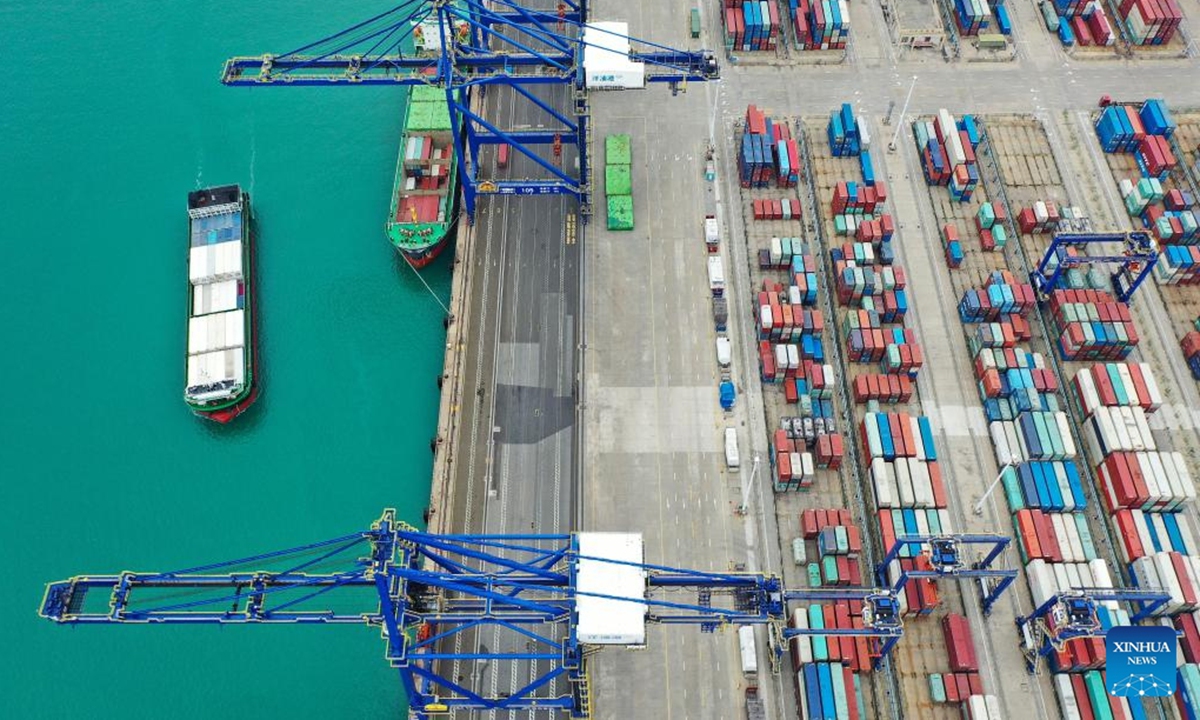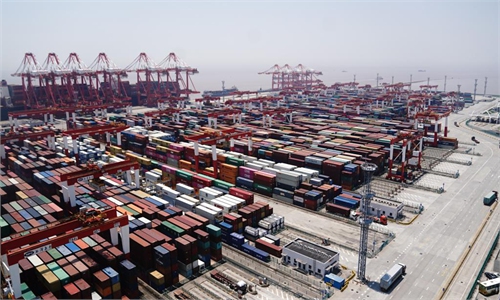
An aerial drone photo taken on March 13, 2024 shows the Yangpu international container terminal in south China's Hainan Province. Photo: Xinhua
Amid the turbulent external market environment, the promotion of regional economic cooperation between China and South Korea for high-end development depends on their ability to resist external interference disrupting regional industrial and supply chains.
China's International Trade Representative and Vice Minister of Commerce Wang Shouwen on Friday held talks with South Korean Trade Minister Cheong In-kyo in Beijing, the Ministry of Commerce announced. The two sides exchanged views on promoting the second phase of negotiations for the China-South Korea Free Trade Agreement (FTA), advancing the high-quality implementation of the FTA, and addressing other bilateral economic and trade issues of mutual concern.
In the context of a complex and ever-changing international trade environment, this development is not only a positive signal for deepening economic cooperation between China and South Korea but also an important step in the process of regional economic integration.
The China-South Korea FTA officially came into effect in December 2015, and it has brought significant economic boosts for bilateral trade cooperation. With the development of the global economic situation, particularly the rise of the digital economy and green economy, both sides believe it is necessary to deepen cooperation and enhance the quality and scope of the FTA, especially in the fields of services and investment.
The essence of their economic relationship lies in the synergy of industrial chains and supply chains. Against this backdrop, advancing the second phase of negotiations for the China-South Korea FTA is particularly important, since it is not merely an improvement and upgrade of the existing cooperation framework but also a further exploration of future cooperation potential.
China needs South Korea's high-tech products, which are integral to Chinese manufacturing supply chains and China's exports.
Similarly, South Korea needs China's market and resources. This complementarity provides broad space for in-depth cooperation in such areas as high-end manufacturing, the digital economy and green energy.
Of course, in the process of promoting the high-end development of the industrial and supply chains between China and South Korea, both countries will inevitably encounter challenges.
It is essential for the two Asian economies to strengthen communication and enhance their resilience against the disruptions caused by US practices, including the overextension of security concepts and the imposition of reckless sanctions on China's high-tech sectors.
This collaboration is crucial for maintaining the stability of their industrial and supply chains and is significant for the healthy development of both countries and the regional economy.
As a vital part of the Asian economy, the stability and development of industrial chains between China and South Korea not only affect the economic interests of both nations but also play a crucial role in the process of East Asian economic integration. In this context, the deepening of China-South Korea FTA could lay a solid foundation for advancing negotiations on the China-Japan-South Korea FTA.
As three major economies in East Asia, China, Japan and South Korea share increasingly close economic ties and significant cooperation potential. The advancement of the trilateral FTA could contribute to the sustainable growth and transformation of all three economies, injecting new momentum into the stability and development of the regional economy.
It was at the Ninth Trilateral Summit Meeting among China, Japan and South Korea held at the end of May that the three countries said they would maintain discussions for speeding up negotiations for a trilateral FTA.
In the current international political and economic landscape, the rise of protectionism and unilateralism poses severe challenges to the negotiations and implementation of the China-Japan-South Korea FTA.
Nevertheless, the ongoing deepening of trade relations between China and South Korea underscores an undeniable demand for enhanced cooperation within the regional industrial chain, which cannot be easily suppressed. Given this context, there is reason to believe that nations in the region possess the necessary means and capabilities to overcome these obstacles.



